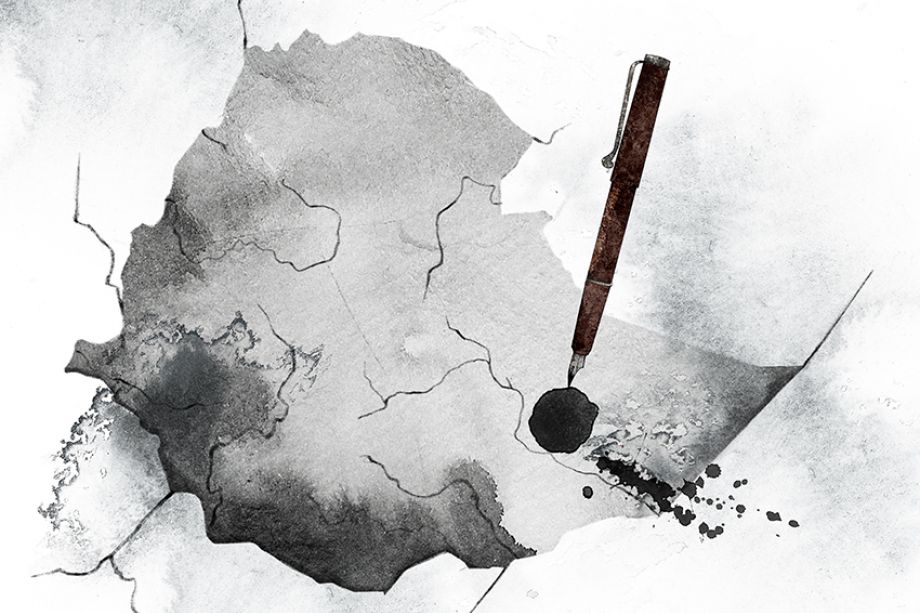
There is Hope Now
Lena Bezawork Grönlund was born in 1975 in Addis Abeba and was raised in Northernmost Sweden. She is a librarian, and her first novel, Slag, was published in 2017. This issue contains a text in which she portrays newly-rekindled hope that has been latent for decades—hope ignited by students in Ethiopia in the 1970s with their dreams of a just society. Now, more than 40 years later, these dreams are slowly but surely coming back to life.
It was the warmest summer in many, many years. A singular heatwave lay itself like a blanket over Scandinavia.
August 2018. My biological father visits Sweden for the first time. He says that it’s warmer here than it ever gets in Addis Ababa. He’s right, the air is still.
The air is still. The grass remains yellow, no matter how much we water it. It’s the same in Västerbotten, which we’d visited a few weeks earlier. Abate rescues the shriveled-up geraniums beneath our windows, puts them in pots inside and gives them water. Every morning, he brings his computer out onto the veranda, sits down at the table outside and listens to the latest news from home.
There was something familiar about that routine, something he said he hadn’t felt in decades.
Looking back. More than forty years earlier he’s sitting on the steps of the university building in Addis Ababa, waiting for his classmates. They are in all likelihood going to one of the political meetings that were taking place during this time. The sun appears from behind the clouds, but never stays for very long. Soon, the 1970s had reached its midpoint. Abate was almost twenty years old. He’d moved to the capital from the countryside and was taking classes at university, in economics among other things. He’d seen his relatives struggle in the countryside in dire conditions. Under a regime that mostly resembled a feudal system, in which the farmers were basically serfs and never owned their land.
Abate believed in socialism, in more people owning the land together.
He got involved in student protests, he believed in a society where more people shared the country’s resources in a fair manner, where farmers could own land. Abate and his comrades had great hopes for a better and fairer society. It was the driving force, for him and many others. They were hopeful, there on the stone steps, it was hope that burned in the young women and men who marched forth in the streets, demanding justice.
My twin sister and I were born in the midst of it all, in the middle of the belief in a fairer future. It’s always been part of our family’s history, and as an explanation of how we were adopted to Scandinavia, too.
It was a revolutionary and overwhelming time in the country’s history. But just as everything was about to change, when Mengistu Haile Mariam seized power in 1977, he broke all his promises, tens of thousands of people were killed or thrown in jail, even more fled the country. Hope was soon replaced by something else entirely. What you’d been able to read about in theory was never put into practice. Mengistu created an authoritarian one-party state with tendencies toward totalitarianism.
Addis Ababa became a different city, divided into smaller kebeles. For every kebele, there was one administration, to which all the details of people’s lives were reported, every pin that dropped without a sound became suspect, shouts turned into whispers, people looked to their sides and over their shoulders before even opening their mouths, their voices changed, became warped, a greeting turned into an act of deletion, a farewell became a portent of death, breaths turned into footsteps, dreams into crumbs, living into dead, friends turned into foes and foes into friends, until everyone was scared of each other.
Abate fled the capital to avoid following orders but still ended up in prison for a while. He remained in hiding outside Addis Ababa in the Ziway region, near the great Lake Ziway, where he worked as a teacher for some time. When he returned to the capital, he was appointed to political offices at the local level out in the provinces. On a small scale, he could work for what he believed in.
When my sister and I visit him in Ethiopia at the beginning of the 2000s, he looks around and lowers his voice before continuing to tell the story he’s been writing about in his letters to us. There was no hope then.
There is hope now.
The new prime minister, Abiy Ahmed, has in what may seem like a miraculous way managed to wrest the key from the hands of a non-democracy. Many say that he’s done more to create democracy in a couple of months than has been achieved in several decades. The changes may seem to have arrived like a bolt out of the blue, but they were preceded by many years of hard work, more than two decades of tireless efforts by women and men.
The hope that resided in the twenty-year-old student in the 1970s now resounds again. It is the hope that wakes my father at dawn, that can be read on his face as he sits down on the veranda of our apartment outside of Stockholm and opens his laptop to press play.

